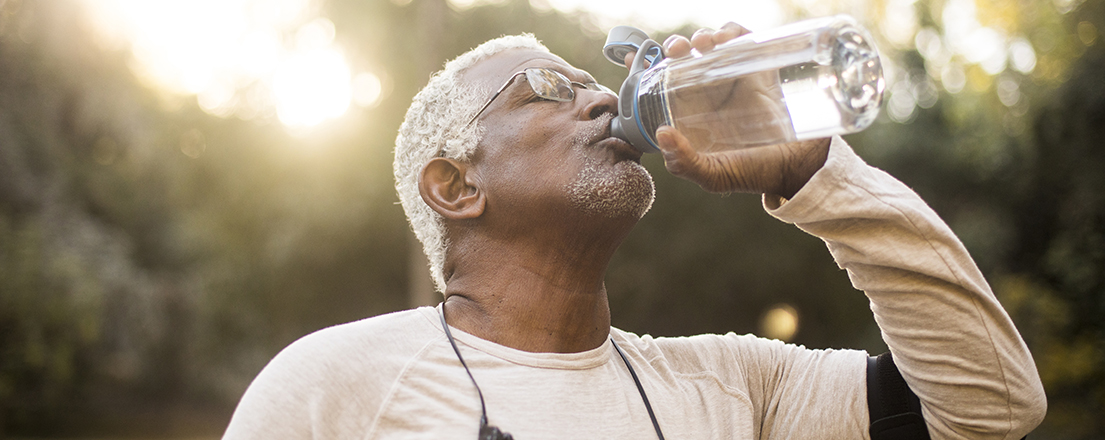
Summer Hydration 101: What Most People Get Wrong (and How to Get It Right)
As Chief Medical Officer at HAP—and just as someone who loves a good spring or summer day—I know how easy it is to forget to drink enough water. When the sun’s out and we’re busy soaking up everything Michigan summers have to offer, hydration can slip our minds.

Charles Bloom, DO, FACOEP
HAP Senior Vice President, Chief Medical Officer
But staying hydrated is one of the most important things you can do to keep your energy up, your mind sharp and your body running smoothly—especially when the heat really kicks in. At HAP, we care about your everyday health, so I wanted to share a few simple, real-life tips to help you stay on top of hydration and avoid the sneaky signs of dehydration this season.
How Much Water Should You Drink?
The commonly cited “eight glasses a day” is a general guideline, but individual needs vary based on factors like age, activity level and climate. The National Academies of Sciences, Engineering and Medicine recommend:
- About 15.5 cups (3.7 liters) of fluids per day for men
- About 11.5 cups (2.7 liters) of fluids per day for women1
These recommendations include all fluids consumed—not just water. During hot weather or intense physical activity, you may need to increase your fluid intake to compensate for additional losses through sweat2.
Tips to Stay Hydrated
- Drink regularly: Don’t wait until you’re thirsty. Thirst can be a delayed indicator of dehydration3.
- Monitor urine color: Aim for pale yellow urine, which typically indicates proper hydration4.
- Eat water-rich foods: Incorporate fruits and vegetables like watermelon, cucumbers and strawberries into your diet.
- Limit diuretics: Reduce intake of alcohol and caffeinated beverages, as they can increase fluid loss5.
- Replenish electrolytes: If you’re sweating heavily, consider drinks that contain electrolytes to replace lost minerals6.
Recognizing Signs of Dehydration
Be aware of the following symptoms:
- Dry mouth and lips
- Dark-colored urine
- Fatigue or dizziness
- Headaches
- Confusion or irritability
If you experience these signs, increase your fluid intake and seek medical attention if symptoms persist7.
Debunking Hydration Myths
- Myth: You must drink eight glasses of water daily.
Fact: Hydration needs vary. Listen to your body and adjust intake based on activity and climate. - Myth: Caffeinated drinks dehydrate you.
Fact: Moderate caffeine intake doesn’t significantly affect hydration levels8. - Myth: Only water hydrates.
Fact: Other beverages and water-rich foods also contribute to hydration9.
Stay proactive about your hydration to enjoy a safe and healthy summer.
HAP members have access to a network of specialists, making it easier to find the right care. To locate a nearby doctor, visit HAP’s Find-A-Doctor Tool.
Footnotes
- National Academies of Sciences, Engineering, and Medicine. (2005). Dietary Reference Intakes for Water, Potassium, Sodium, Chloride, and Sulfate. https://www.ncbi.nlm.nih.gov/books/NBK56068/ ↩
- Mayo Clinic. (2022). Water: How much should you drink every day? https://www.mayoclinic.org/healthy-lifestyle/nutrition-and-healthy-eating/in-depth/water/art-20044256 ↩
- Centers for Disease Control and Prevention (CDC). (2022). Get the Facts: Drinking Water and Intake. https://www.cdc.gov/nutrition/data-statistics/plain-water-the-healthier-choice.html ↩
- Cleveland Clinic. (2021). What the Color of Your Urine Means. https://health.clevelandclinic.org/urine-color-chart/ ↩
- U.S. National Library of Medicine. (2021). Dehydration. https://medlineplus.gov/dehydration.html ↩
- Mayo Clinic News Network. (2020). Electrolytes and hydration. https://newsnetwork.mayoclinic.org/discussion/why-electrolytes-are-important/ ↩
- NIH News in Health. (2019). Dehydration: A Hidden Danger. https://newsinhealth.nih.gov/2019/07/dehydration-hidden-danger ↩
- Institute for Scientific Information on Coffee (ISIC). (2016). Caffeine and Hydration: Debunking the Myth. https://www.coffeeandhealth.org/topic-overview/caffeine-and-hydration ↩
- Harvard T.H. Chan School of Public Health. (n.d.). The Nutrition Source: Water. https://www.hsph.harvard.edu/nutritionsource/water/ ↩
